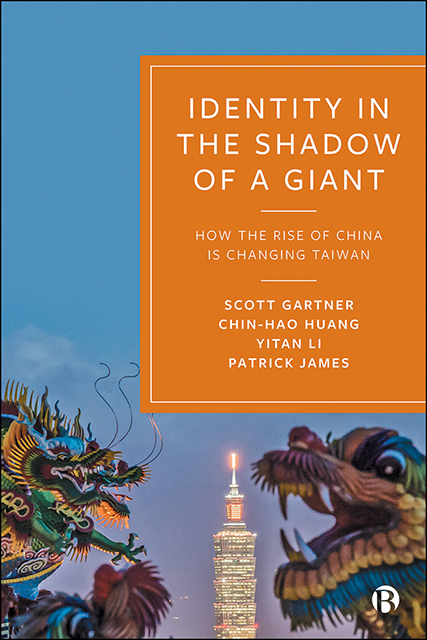Book contents
- Frontmatter
- Dedication
- Contents
- List of Figures and Tables
- About the Authors
- Acknowledgements
- Preface
- 1 Identity in the Shadow of a Giant: How the Rise of China Is Changing Taiwan
- 2 Taiwan in Historical Perspective
- 3 The Problématique of Taiwanese Identity
- 4 Theorizing about Identity, Change in Capabilities and Dyadic Relations: An Approach Based on Analytic Eclecticism and Systemism
- 5 Elite Reflections
- 6 Popular Reflections (Survey I)
- 7 Factors Influencing Identifying Only as Taiwanese: A Layered Empirical Approach (Survey II)
- 8 A New Vision of Taiwanese Identity, the Rise of China, Cross-Strait Relations and the United States in Northeast Asia
- Appendix A Research Interview Questions, September–October 2015
- Appendix B Taiwanese Identity and the Rise of China: Survey Questions, 27 October 2015
- Appendix C Taiwan National Security Survey by Emerson Niou
- References
- Index
Preface
Published online by Cambridge University Press: 15 April 2023
- Frontmatter
- Dedication
- Contents
- List of Figures and Tables
- About the Authors
- Acknowledgements
- Preface
- 1 Identity in the Shadow of a Giant: How the Rise of China Is Changing Taiwan
- 2 Taiwan in Historical Perspective
- 3 The Problématique of Taiwanese Identity
- 4 Theorizing about Identity, Change in Capabilities and Dyadic Relations: An Approach Based on Analytic Eclecticism and Systemism
- 5 Elite Reflections
- 6 Popular Reflections (Survey I)
- 7 Factors Influencing Identifying Only as Taiwanese: A Layered Empirical Approach (Survey II)
- 8 A New Vision of Taiwanese Identity, the Rise of China, Cross-Strait Relations and the United States in Northeast Asia
- Appendix A Research Interview Questions, September–October 2015
- Appendix B Taiwanese Identity and the Rise of China: Survey Questions, 27 October 2015
- Appendix C Taiwan National Security Survey by Emerson Niou
- References
- Index
Summary
Scott and Pat visited Taiwan a few years ago for a conference. While the discussions were great and our hosts superb, what we remember most is one of Scott's interactions with a graduate student who volunteered to show him around Taipei. On the subway ride to see a temple, she berated Scott for the US position that encouraged strong bilateral economic and military relations with Taiwan but stopped short of recognizing Taiwan as sovereign. She pointed out that Taiwan had all the elements of an independent country, its own government, foreign policy, independent military and a unique currency. “Why”, she asked, “does the US refuse to recognize Taiwan's independence?” She summed up her view by stating definitively: “I am Taiwanese not Chinese!”
When Scott and his Taiwanese guide arrived at the temple, however, and Scott was about to enter into the nearest entrance, the guide suddenly grabbed him: “Stop”, she shouted, “we Chinese always enter temples from the right through the dragon door.” (Hence the phrase, enter the dragon, exit the tiger.) Scott and Pat were struck by the rapid alternation of her stridently affirmed identities.
Many people in Taiwan identify themselves as politically Taiwanese and culturally Chinese. As Pat and Scott discussed this duality in Taipei, they wondered if the perceptions of China's ascendant economic and political power shaped these identities, making them more fluid and multidimensional, and consequently, more manipulable by leaders in both countries? To their delight Yitan and Chin, both of whom have been studying cross-Strait relations, Chinese foreign policy and US–Asia relations, also were interested in exploring these issues and our team and this book project emerged. The outcome of this joint collaboration reflects analytic eclecticism that offers bold, new insights on one of the most nettlesome security challenges in the region.
While this array of seemingly conflicting identities influenced by great power and regional politics could appear obvious to those from Taiwan and the region, it might seem hard for others to understand. But these dynamics are not unique to Taiwan. Around the world, citizen identities that culturally embrace and politically oppose a nation create the need for nuanced diplomacy and a multilayered approach for understanding identity formation (one might see seemingly similar discordant beliefs in an American Southerner's simultaneous declarations of both ribald American patriotism and defence of the Confederate flag).
- Type
- Chapter
- Information
- Identity in the Shadow of a GiantHow the Rise of China is Changing Taiwan, pp. xiii - xivPublisher: Bristol University PressPrint publication year: 2021

